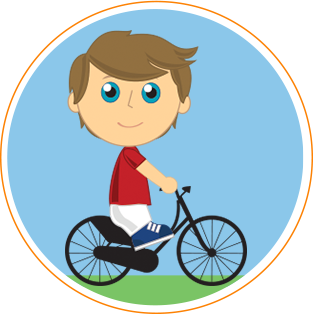Dutch habits and customs

Dutch habits
The Dutch have some unique customs and habits that may seem strange to foreigners.
- Gezelligheid - Gezelligheid is an important concept in Dutch culture. It means cosiness: being together, having fun and relaxing. Gezelligheid kent geen tijd is a famous dutch expression. Gezellig he?
- Oranje, oranjegevoel - Orange is the color of the Dutch. The Dutch wear orange on Kingsday and when the dutch football team is playing (high level only).
- Zuinigheid - Fruitfullness, the dutch generally don't like to spend more than necessary and will watch de kleintjes (small coins).They pay close attention to their pennies and go dutch or send a tikkie (online share costs or pay back what someone has spent for you).
- Complaining - The Dutch love to complain, and talk negative but that doesn't mean they are unhappy. It's more of a way to connect with each other. Most popular topic is the weather to complain about, it is often too cold, rainy or too hot.
- Cycle - The Dutch cycle, in the rain, with children, doing groceries, everywhere. People sit at the back of the bicycle, with the legs on one side.
- Directness - The Dutch are generally very direct in their communication. They say what they think and like honesty.
- No small talk - The Dutch dislike unnecessary small talk and like to get directly to the point.
- Kringverjaardag - It is a habit to celebrate ones birthday in a circle of chairs. One of my former collegues reminded me of this dutch habit. It goes like this, either it is a dutch party and you bring your own food and often a kring verjaardag. Th -ere is not much swapping of chairs and a lot of talking in the group, less individual talks perhaps with your neighbours sitting on the right and/or left side.
- Happy birthday - Is wished to everyone attending the kringverjaardag, not only meant for the celebrant.
- Self-reliance - Dutch people are very self-reliant and like to solve problems themselves. Not to be dependent of another person.
- Kingsday - It is celebrated the night before the 27th (birthday of the King) and the day itself. The Dutch wear orange and especially in Amsterdam and bigger cities it is celebrated on the streets. For the children in all kind of places there is the Vrijmarkt: second hand stuff is sold on the streets.
- Broodje kaas - The Dutch often lunch with a cheese sandwich or other cold snacks. Hot lunches are less common. Pre-made sandwiches are made and put in a lunch box and that is what the Dutch have for lunch.
- Beschuit met muisjes of hagelslag - Hagelslag (chocolate sprinkles) and muisjes (small anise seeds) are popular toppings for sandwiches. Round toast with muisjes is served when a baby is born in the specific colors of the baby's gender.
- Drop is a salty licorice-like candy that many Dutch people like. Many foreigners do not like the salty licorice, the sweet drop they like better.
- Koffietijd - The Dutch love coffee and often drink it with cake or pastries or one cookie (not two or three) you can take out of the cookiejar and afterwards it closes.
- Frikandel, kroket or bitterbal - A frikandel is a deep-fried meatloaf that is a popular snack or try a bitterbal: small fried veal, beef in a crunchy jacket.
- Stamppot is a traditional stew of potatoes and vegetables, with kale (boerenkool), onion and carrot (hutspot), sourkraut (zuurkool), andijvie, spinach etc etc.
- Birthday calendar or tiles- Many Dutch people have a birthday calendar hanging on the toilet so they never forget a birthday or a tile with Delfts blauw with a wisdom like sentence for example: Oost, west, thuis, best. East, west, home is the best.
- Sinterklaas - Every year on december 5 children get gifts from Sinterklaas (kind of Santa claus) when they have been good children. The gifts are also given after Sinterklaas has entered the Netherlands and you put your shoe near the chimney, with a carrot for his horse and sing a song. The whole Zwarte pieten discussion is mentioned somewhere else.
- Dutchies - As a slang term for cannabis joints or blunts, or a few different entities related to Dutch culture and travel. I am refering to this image, one of the Dutchies! Our mascotte.











Add new contribution